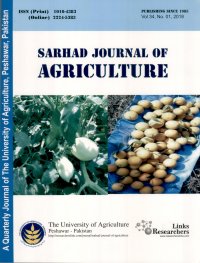Study of Heterosis and Inbreeding Depression under Natural and Water Stress Conditions in Diverse Maize Hybrids
Study of Heterosis and Inbreeding Depression under Natural and Water Stress Conditions in Diverse Maize Hybrids
Muhammad Ilyas1*, Sardar Ali Khan1, Shahid Iqbal Awan1, Shafiq-ur-Rehman1, Muhammad Riaz Khan2 and Sumaira Hafeez1
ABSTRACT
The present study was conducted to evaluate 108 inbred lines of maize planted in two separate trials under normal irrigation and water stress conditions. Parental selection for further study was done with regards to grain yield and its related traits. Inbred lines explained a broad range of genetic variability and displayed different levels of drought tolerance. Four inbred lines were selected i.e. VDR-51, DR3-126, DR-37 and 5CDR-53. Crosses were done among the selected inbred lines. Six generations as P1, P2, F1, F2, BC1 and BC2 were prepared for both the crosses to calculate heterosis and inbreeding depression for Randomized Complete Block Design under split plot arrangement. Highly significant inbreeding depression was recorded for all traits indicating a dominant type of gene action. Heterosis was high for both crosses along with high inbreeding depression. All these results exhibit that the hybrid breeding is the best option for inbreds to exploit their potential.
To share on other social networks, click on any share button. What are these?







